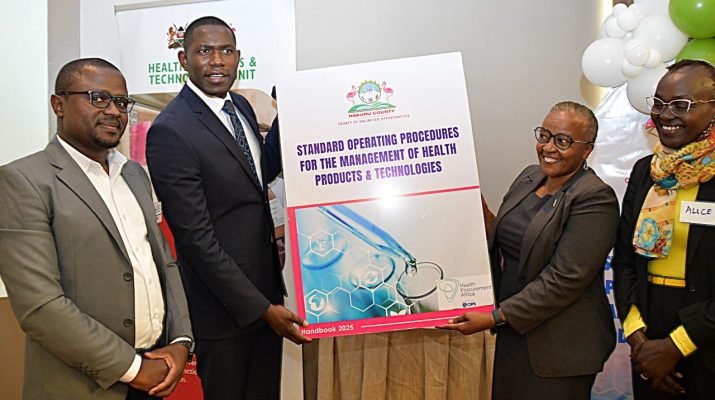By Dorothy Musyoka
In efforts to strengthen its Health Products and Technologies supply chain, Kenya has renewed focus on self-reliance, sustainability, and efficiency.
Speaking during a high-level forum themed “A Shift Towards Self-Reliance and Sustainability in Health Products and Technologies Supply Chain in Response to the Evolving Funding Environment,” the Principal Secretary for Medical Services, Dr. Ouma Oluga, unveiled reforms aimed at transforming the country’s health supply systems.
The reforms include:
- Strengthening procurement, warehousing and last-mile delivery systems
- Reshaping KEMSA to enhance efficiency in distribution and logistics
- Reducing the cost of health products through expansion of local pharmaceutical and medical technologies manufacturing.
According to the PS the reforms will address the demand for health services and the growing cost of medicines.
“Building self-reliance in health supply chains is not only a strategic necessity but a moral obligation. We must invest in local capacity, innovation and partnerships to ensure every Kenyan has uninterrupted access to essential medicines and technologies,” Dr.Oluga stated.
A major highlight of the forum was the launch of the Standard Operating Procedures (SOPs) for Health Products and Technologies, designed to streamline processes, strengthen accountability, and enhance efficiency across the entire supply chain.
The launch was led by Dr. Oluga, alongside John Karani, Chair of the Kenya Institute of Supplies Management, and Dr. Tom Menge, Acting Head of the HPTs Directorate at the Ministry of Health.
In line with Digital Health Transformation Agenda, the Ministry of Health is also rolling out digital supply chain systems through the Digital Health Agency to improve forecasting, enhance accountability, and enable timely replenishment.
Dr. Oluga further emphasized that expanding local manufacturing remains central to the reforms, reducing import dependency while stimulating economic growth and job creation.
“Government is exploring public–private partnerships in warehousing and distribution while pursuing pooled procurement to secure stronger bargaining power and reduce costs. Expanding local manufacturing remains central to reducing import dependency and stimulating economic growth ,” Dr Oluga noted.
The forum brought together key stakeholders, including representatives from the Department of Health Products and Technologies (DHPT), Council of Governors (CoG), county governments from Isiolo, Trans Nzoia, Nakuru, Kakamega, Laikipia, Murang’a, and Nairobi, as well as the Public Procurement Regulatory Authority (PPRA). Development partners present included CIPS/HPA, InSupply, World Bank, Africa Resource Centre, ThinkWell, PATH, Ecumenical Pharmaceutical Network, MEDS and KEMSA.
Dr. Oluga noted that the reforms mark a transformative shift towards a resilient and sustainable health supply chain that guarantees equitable access to essential medicines and health products for all Kenyans.

